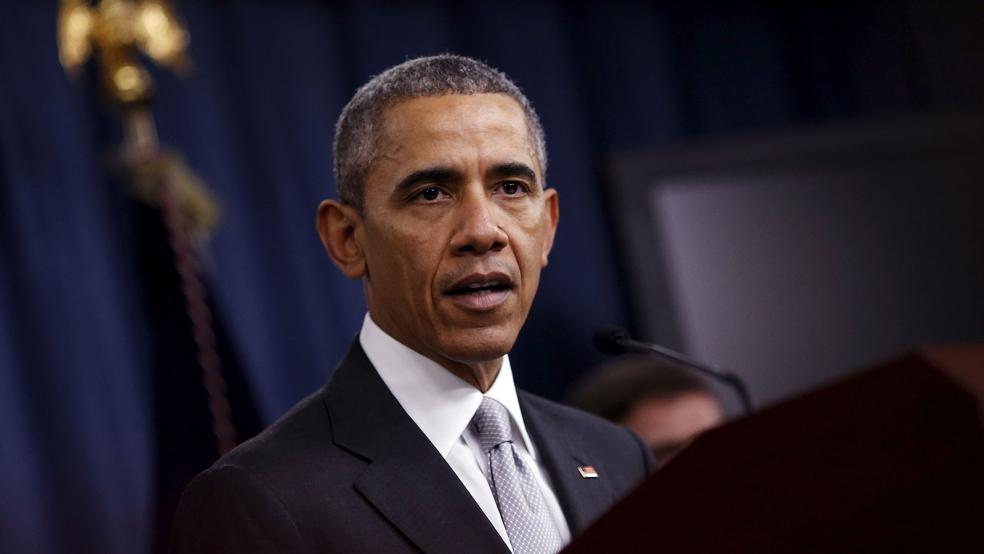President Obama and Vice President Joe Biden had some advice for House Democrats gathered in Baltimore for a retreat late last week: If their party had hopes to retain control of the White House and chip into the Republicans’ hold on Congress, then Democrats should enthusiastically embrace the achievements of the president’s administration.
“Democrats will win in November and we will have a Democratic president succeed me, just in case there is any confusion about that,” Obama said at a rally-style gathering. “The reason I can say that is we focus on the things that matter in the lives of the American people.”
But as The New York Times reported on Friday, the gathering was far less exuberant than it was during a similar event in 2009, when the Democrats held the majority with 257 seats and then- Democratic House Speaker Nancy Pelosi of California was able to push through Obama’s economic stimulus plan and health care law.
Related: Clinton and Obama Launch Their Mutual Support Group
For sure, former Secretary of State Hillary Rodham Clinton has chosen to wrap herself in the mantle of the Obama administration in struggling to fend off a vigorous challenge from Sen. Bernie Sanders of Vermont for the Democratic presidential nomination. By Clinton’s lights, praising Obama for leading the country out of the Great Recession, enacting Obamacare to help millions of uninsured Americans and negotiating a nuclear non-proliferation deal with Iran is good politics in trying to woo liberal Democrats and moderates to her side in Iowa and beyond.
But the president has a much tougher sell with Congressional Democrats, who have seen their fortunes fade over the past two elections after Republicans closely linked them to controversial Obama policies.
Those policies include the much-maligned Affordable Care Act, environmental clean air policies that conservatives insist are anti-business and job killers, his extensive use of executive orders to circumvent Congress, and a strategy for defeating ISIS that many believe is woefully inadequate.
Related: As Sanders Surges, Dems Finally Realize They Have a Race on Their Hands
Today, there are only 188 Democrats in the 435-member House, and regardless of what Obama and Biden say, no one seriously believes they have a chance to do anything more than put a small dent in the GOP majority.
And with congressional politics so varied and situational – often depending on the shape and composition of the district and local issues as much as more national concerns – every Democrat must make tough calculations on how closely to align themselves with Obama this year.
“I think each Democratic member running for reelection and each Democratic challenger is going to have to make their own decision on what they need to do to win their race,” said Nathan L. Gonzales, a political analyst. “They’re going to have to decide how much to embrace the administration and how much to run against the administration.”
The Five Most Endangered Senate Republicans
“Democratic candidates have a difficult balance of needing the energy of the Democratic base that’s still excited about President Obama, but they also need independent voters who might be kind of turned off by the President after the last seven years,” said Gonzales of the Rothenberg and Gonzales Political Report. “I don’t think there’s a magic formula, but these members are going to have to make that call.”
Many Democrats are still licking their wounds from the 2010 and 2014 elections, according to The Times, when their party took the blame for Obama’s aggressive and unpopular agenda for restoring the economy and enacting the Affordable Care Act without the support of a single Republican in the House and Senate.
Republicans swept to control of the House in 2010 with the help of angry Tea Party members. Then the GOP gained control of the Senate in 2014 in an extraordinary election in which five incumbent Democrats in Alaska, Louisiana, North Carolina, Colorado and Arkansas were ousted throughout the country despite their best efforts to run away from Obama’s record.
House Republicans hold such a large majority, with 246 of 435 seats, that it would take a massive political upheaval to enable Democrats to regain control. But that’s not the case in the Senate where the Republicans hold a slender 54 to 46-seat majority, and the Democrats conceivably could forge a slender majority by winning back a small handful of seats currently held by the GOP.
Related: How Trump Could Bring Down Senate Republicans in 2016
However, presidential contests typically influence the outcome of down-ticket races. And with so much uncertainty over whether Clinton or Sanders will head the Democratic presidential ticket and the prospects that billionaire Donald Trump will claim the GOP nomination, it’s impossible to say how the congressional races will play out this year.
Clinton has abandoned an early strategy of trying to distance herself from the president on foreign policy and other matters, and instead is now presenting herself as the heir to his legacy. While things no doubt will be much different during the general election campaign, when Trump or whoever is the nominee pounds Obama over his domestic and foreign policy measures, Clinton is getting mileage among progressives and moderates in touting her ties to the president.
At the same times, she has sharply criticized Sanders for suggesting that the president has been too cozy with Wall Street – the same criticism he has leveled against Clinton during debates and now in TV ads in the run-up to the Iowa caucuses Monday night.
“President Obama has led our country out of the Great Recession,” she said. “I’m going to defend President Obama for taking on Wall Street, taking on the financial industry and getting results.”





